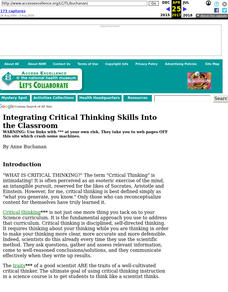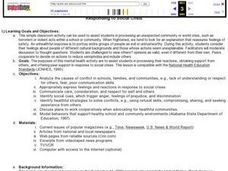Curated OER
Integrating Critical Thinking Skills Into the Classroom
Students receive an overview of critical thinking techniques. They break into small groups and practice reasoning through questions, identifying, presenting and justifying their answers.
Curated OER
History Today
Students use the newspaper to determine how history is being made in your community, region or country.They identify the different components that comprise a newspaper. This lesson contains adaptations from elementary to high school.
Curated OER
The Making of a Leader
Students participate in a class discussion and conduct independent research about the life skills Ralph Bunche developed because of the influences of others, his life experiences, and the obstacles he had to overcome as a youth. They...
Curated OER
Genetic Counseling
Students apply the principles of ethical decision making to actual cases. They appreciate that there is usually no one "right" decision. Students compare their conclusions to those of individuals who are in the field.
Curated OER
What Did You Say?
Twelfth graders identify main ideas in reading selections. They read newspaper letters to the editor, identify the main ideas, list the supporting details, and present each side of the issue to the class.
Curated OER
Skepticism Toward Government
Students explain how the media portrays certain events and its effects on public opinion of government. They focus on Watergate, the Vietnam War, and the Clinton impeachment. They write essays about skepticism promoted by the media.
Curated OER
Lippmann vs. The Testers: Can Intelligence Be Measured?
Pupils examine the ideas of Walter Lippman and standardized testing. They discover the ideas and beliefs behind using standarized tests. They examine a copy of an IQ test and discuss.
Curated OER
Conservation
Fifth graders examine how destructive fishing practices affect the health of coral reefs. They watch a Powerpoint Presentation, conduct an experiment, and in small groups create a Powerpoint Presentation.
Curated OER
Oh, California: Understanding Primary Sources: What Did John Muir See?
Students read a selection from the writings of John Muir. They discover his view on California and its natural resources. They create a display of images that show what California has to offer.
National First Ladies' Library
Pandemics: The Swine Flu of 1918
Students study pandemics through the investigational research of the 1918 swine flu. They apply the information by choosing a current virus and role-playing a member of the Centers of Disease Control (CDC).
Curated OER
Creative Writing - I AM A FISH
Ninth graders write a letter to the editor about the impact of people on marine life from the point of view of a fish.
Curated OER
Freckle Juice
Third graders read Freckle Juice as a shared literature experience. This lesson plan has many good ideas of extensions you can do as your students go through the story.
Curated OER
Hydraulic Mining Offline Lesson
Students utilize a variety of source materials to explore reasons for supporting or opposing hydraulic mining. A mock court hearing is held where a decision to allow the continued use of hydraulic mining is made.
Curated OER
Responding to Social Crisis
Students, through discussion, identify ways to cope with and process unexpected community or world crisis, such as terrorism or violent acts within a school or community.
Curated OER
Slick Moves: Exploring the Controversial Plan to Drill in the Arctic National Wildlife Refuge
Students recount their knowledge of natural resources and articulate their understanding of the multi- faceted debate that surrounds drilling in the Arctic National Wildlife Refuge. They then examine the complexity of drilling in the...
Curated OER
Study Unit 4, Revised: Run-On Sentences, Comma Splices and Fragments
In this language arts worksheet, students read 20 sentences and look for errors. Students write R if the sentence is run-on, CS if there is a comma splice, F for a sentence fragment and C for a correct sentence.
Curated OER
Statistics and Probility
Seventh graders collect data and make predictions. In this geometry lesson, 7th graders work in tiers collecting data and plotting it. They make inferences and predictions about their collected data.
Curated OER
Breaking News English: World Naked Bike Ride Against Oil Use
In this English worksheet, students read "World Naked Bike Ride Against Oil Use," and then respond to 47 fill in the blank, 7 short answer, 20 matching, and 8 true or false questions about the selection.
Curated OER
Science and the Scientific Process
Students investigate the characteristics of different soil samples. In this physical science lesson, students play the role of forensics solving a crime by matching soil from the suspect's shoes. They formulate a conclusion after testing...
Other
Center for Ecoliteracy: New York Times Magazine: We Are What We Eat
This article discusses the overproduction of corn and how it is contributing to obesity in our population. Corn, a starchy substance, is in everything we eat and drink. It explains the effect and what needs to be done to reduce it.
Other
Time, Inc.: Martin Luther King Jr.: Never Again Where He Was
Original article text from Time Magazine, January 3, 1964, in which Martin Luther King, Jr. was featured as "Man of the Year."
Other
Youth Time Magazine: Does Over Reliance on Tech Affect Our Ability to Spell?
Technology can bring a lot of convenience into our lives. But it can also make us rely a little too much on our phones, tablets, laptops, and smart watches. Spelling and grammar is something that seems to suffer due to our over-reliance...
Time
Time Person of the Year 2015: Donald Trump
Time Magazine Person of the Year article features Donald Trump.
Text Project
Text Project: Fyi for Kids: Vol. 1, Issue 3: Posters Over Time [Pdf]
This magazine article explains how posters were used years ago for news and how they are used today for advertising.






















